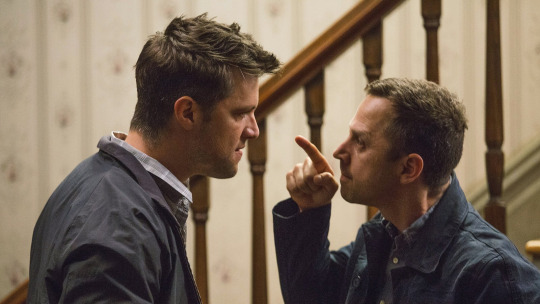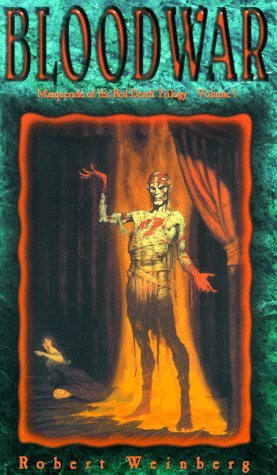#Giovanni need more choking by men challenge
Explore tagged Tumblr posts
Text
Giovanni Ribisi as The Guy who was manhandled by their daddy




Giovanni Ribisi is babygirl




AVATAR saga
Parker Selfridge x Coronel Miles Quaritch

Sneaky Pete (3 Seasons)
Marius Josipovic x Officer Taylor Bowman

#giovanni ribisi#avatar#avatar the way of water#parker selfridge#Marius Josipovic#Miles Quaritch#Taylor Bowman#Giovanni need more choking by men challenge
8 notes
·
View notes
Text
Part 1, Chapter 11
Or: Oh Boy, Here I Go Killing Again

Blood War: Masquerade of the Red Death Trilogy Volume 1
Washington DC—March 12, 1994
We’re back with Makish as he continues his contract work for the Red Death.
Normally, a city the size of the nation’s capital could support a dozen Kindred comfortably.
It’s implied any more than that and people will start noticing the disappearances, or all the people waking up with less blood in them than the night before and no memory of why that is. I think it’s also a holdover from the tabletop game, where you’ve got the established canon characters living in a city, the player characters, and a few of the storyteller’s OC’s. You don’t expect the poor storyteller to come up with a whole functioning Kindred community, so your average game might have about a dozen or so vampire characters. Though, that population number makes many vampire conflicts seem sillier and pettier. All that political maneuvering and deception just to rule over about eleven other dudes.
Despite half of the city being a warzone where even the police fear to tread, the city still gets over ten million tourists visiting a year. Disaster tourism, I guess. Combined with the regular political changing of the guard resulting in a constantly shifting population, a city that can usually fit in a dozen vamps can fit several dozen.
Last night, the Red Death had lowered that number by two. This evening, Makish planned to continue that trend. Following the instructions of his grisly employer, the Assamite intended to wipe out more than a quarter of the Kindred residing in Washington. It was an ambitious plan, but Makish enjoyed challenges. The Red Death had proposed a sliding-scale bounty for each vampire slain. The greater the number killed, the larger the reward per Final Death. Tonight, Makish was feeling very greedy. And quite lethal.
Makish’s target this chapter is in a “popular private men’s club” called The Deadlands, located in Anacostia.
It was located east of the Anacostia river in one of the worst neighborhoods in Washington.
Hopefully Anacostia’s being portrayed like this because it’s the World of Darkness, a Harsher, Crueler Version of Our World, and not because it’s a low-income black neighborhood.
No one visited The Deadlands without a bodyguard. Or tried to enter without an invitation.
The club’s owned by an eighth-generation Toreador named John Thompson, a Camarilla liaison with the U.S. government who controlled several powerful politicians by, well, pimping to them.
Well connected with the most corrupt power mongers in the capital, Thompson worked hard to satisfy the most decadent wishes of his establishment’s exclusive membership.
Unfortunately for his “employees”, Thompson’s pimping style seems to be a Littlefinger as Jeff Epstein kind of deal, his services ranging from offering your typical vanilla paid sex to crueler fair.
No desire was too extreme for those who frequented the Deadlands. Sex and drugs were the norm. Orgies took place every night. Sadism, torture, even ritual sacrifice could be experienced—for the right price. More than one tax increase had been passed to help pay Thompson’s fee for a Congressman’s outrageous request.
You know what’s sad? In this real life hellworld, if politicians were paying to torture and murder prostitutes with their constituents’ tax money, would we even be surprised at this point? Plus, a chunk of the country would suddenly become openly pro prostitute murder and pay more money in taxes to “trigger the libs.”
Despite being Camarilla, Thompson’s business practices sound like something a Toreador antitribu would do, those guys finding beauty in the suffering of others. Makish seems to agree.
Makish was, in his own twisted manner, a highly moral individual. He considered Thompson a necessary but unfortunate link between the world of the living and undead. To ensure their safety, Kindred needed control over important people in government. That much Makish accepted. The assassin, however, found extremely distasteful the constant pandering to the basest instincts of the politicians. He felt such acts put the Camarilla on the same level as the hated Sabbat. Removing Thompson promised to be an enjoyable artistic endeavor.
Makish arrives at the club just after 1:00 am, with a bag full of handy assassin gadgets. He’s already in high spirits because he killed three racist thugs who tried to jump him on his walk to the club.
Before attacking, they had stupidly made several insulting remarks about the color of his skin and the nature of his ancestors. It had been bad judgement on their part. The Assamite had strangled the trio with their own intestines. Makish considered the horrified look of stunned disbelief in their eyes as they choked to death adequate repayment for their affronts to his dignity.
The club’s front entrance guarded by a half-dozen brick shithouse ghouls openly carrying AK-47′s.
No police patrolled this section of the capital. None dared.
More likely the ghouls look white enough to carry assault rifles in an American city, so the cops leave them alone.
Makish smiled and shook his head. Like too many of the Kindred, Thompson had grown complacent. He believed himself invulnerable. Dealing with ordinary humans had dulled the edge of his wits. Ghouls were stronger and faster and deadlier. However, they lacked imagination and realization what a truly powerful Kindred could do if provoked.
The Red Death mocked Kindred who depended on basic technology like security cameras. Madeleine Giovanni tore through the Mausoleum’s defenses and criticized its dependence on ghouls. Now Makish is doing the same. Is there any kind of security method these undead pricks don’t smugly look down on? I’m starting to think Vampire: The Masquerade should have kept the “vampires need to be invited in” rule.
Wait, I remember now. Madeleine couldn’t infiltrate Don Caravelli’s hideout. ‘Course, what defenses he has, beyond Kindred bodyguards, are suspiciously unmentioned. Maybe next book.
They were no match for an Assamite assassin. Especially this particular Assamite assassin. A direct assault would take too much time and give Thompson a chance to escape the surroundings. But there was more than one way to enter a fortress. Any fortress.
The Assamite Clan was renamed as the Banu Haqim in V5, and the term “Assamite” was changed into a disparaging nickname. At first I thought this change was because Assamite may have been a slur, but every google result leads to something V:TM related. It looks like Assamite’s just the word “assassin” changed up, making phrases like “Assamite assassin” sound redundant. No insensitivity in this case. Just a stupid name.
Makish does some rooftop hopping to get to The Deadlands.
The club was less than thirty feet away. The ghouls never looked up.
John Thompson exclusively ghouls stealth game NPCs.
The Deadlands is a rebuilt and reinforced Victorian mansion. Pretty extensively rebuilt too, since it’s five stories tall and Victorian homes typically had only two or three. It has alarms and motion detectors embedded in the roof and gables, which don’t go off when Makish lands on it.
The Assamite had mentally locked them into their present setting. Makish possessed incredible powers over machinery.
This again. I did some digging and learned there’s a branch of Thaumatergy called the Path of Technomancy. It could allow Makish to do this, but it was introduced in the Revised version of the Camarilla sourcebook released in 1999, four years after Blood War was published. It could also be a form of telekinesis. Whatever the case, it’s still a bullshit power to bust out so casually. It isn’t even unique to Makish.
Sensing that the only people on the top floor are two humans “engaged in an act of passion,” he hardens his fingers, peels off a section of the roof, and jumps down.
Thompson was two levels down, talking business with a pair of potential customers. Running on a tight schedule, Makish had no time for subtlety. He planned leaving no survivors of his attacks. While he disliked killing innocent bystanders, these lawmakers could hardly be described as guiltless. Murdering them was probably doing their constituents a favor.
The moment Makish enters, his stealth rating is immediately ruined. Those two mortals banging in another room? The ones Makish specifically noted and decided were unlikely to notice him entering? Makish was so busy fantasizing about killing corrupt politicians that he didn’t notice one of them, a high-priced prostitute, rush out of the room until she starts screaming. He quickly reads her mind, because he didn’t have enough powers. Look, he’s a thousand years old, so he gets a shmorgishborg of disciplines. He learns that her john, an old fuck of a senator, had a heart attack during his throes of passion. Classic scenario, I know. She ran out to find help, only to find this random Indian guy breaking in through a hole in the roof.
I’d like to say things go well for the woman. That Makish can also erase memories and wipes her mind so she forgets ever seeing him, or that he just knocked her out. But this is a dark fantasy story, and typical of dark fantasy, the sex worker dies.
“My apologies,” said Makish regretfully and slapped the screaming woman hard across the temple. The blow instantly shattered her skull and she collapsed on the floor in a pool of blood.”
Oh Makish. You were almost the most heroic character in this book. But hey, at least he feels sorry about it, eh? Eh? Eh.
He then checks on the senator in the room she ran out of, dragging her corpse along with him.
The senator lay on the bed, clutching his chest, gasping for breath. He had suffered a minor coronary. Enough to incapacitate him, but not to kill. Makish completed the job by tearing out the man’s heart.
Unnecessary, but I’m not going to judge him for that one.
“Casually, he threw the woman’s body across the politician’s. United in life, he felt it proper that they should be united in death.”
This I’ll judge him for. You already killed the poor woman, you don’t have to make it worse by trying to symbolically link her with the gross old guy she was paid to fuck. Friggin’ artists...
Alarms, activated by the girl’s screams, were ringing throughout the house.
You ask me, scream-activated alarms aren’t a good idea to have in a whorehouse.
Seriously though, a guard must have heard the screaming and sounded the alarm. Makish doesn’t use his maybe-tehcnomancy to turn them off.
He preferred minor chaos when he worked. Confusion served him well.
See? He meant to blow his cover the instant he entered the building.
Makish hurries downstairs and bumps into three armed ghouls. Pretending to be a terrified innocent bystander, he points them upstairs, telling them the now-dead senator might be dying. Then he tears out there throats as they run past him.
There aren’t any more interruptions on his way to Thompson’s office. He slips in, nods pleasantly to the two politicians inside, then kills them by smashing their heads together.
Thompson, a short, squat man with a huge handlebar mustache, gaped in astonishment.
Toreador are stereotyped as the Beautiful Vampires, but for every sexy male Toreador you get an average-looking schlub like Isaac Abrams and this guy. And no, I’m not giving him any points for the mustache. People with handlebar mustaches after 1900 are compensating for having no personality.
“Who-who are you?” he asked.
“I bring justice,” said the assassin, aware of the hidden camera and tape machines recording his every word and action. His rather stilted dialogue had come directly from the Red Death.
On the one hand, I love that Red D.’s canonically a bad writer. On the other, this is coming from an actual writer who’s allergic to contractions, and it’d be hard to notice when the dialogue is intentionally stilted without us being told so.
“For too many years your presence in this city has offended the Sabbat. Tonight that insult ends.”
You’d think being recorded claiming to represent the Sabbat would cause Makish future trouble getting Camarilla contracts, but he doesn’t look worried about it.
Thompson tries to stall for time, saying they can make a deal, but Makish already read his mind and knows about the already-pressed security button under his desk, and the hidden emergency escape passage nearby.
Makish toyed with the idea of letting Thompson escape into the passage, extending the hunt by a few minutes. It appealed to his sense of irony. But business was business and he had numerous other killings to perform tonight. Sometimes art had to be sacrificed in the name of expediency.
And sometimes expediency is needed to get an artist to make art at all. Am I right or am I right?
Makish reaches into his assassin bag and pulls out a big-ass wooden stake. Thompson shrieks and tries to escape, but Makish quickly stakes him in the heart.
Contrary to popular belief, a wooden stake didn’t kill a vampire. However, it did paralyze the Cainite until removed. Thompson was unharmed, merely immobilized. Which was exactly what Makish wanted.
I’d like to thank Weinberg for not subjecting us to yet another one of those “everything the movies say about vampires is bullshit” speeches that’s in every other vampire story. Even Bloodlines couldn’t resist one.
Also, “unharmed” like stabbing someone in the chest with a big wooden spike leaves no mark.
Next out of Makish’s bag is a roll of gray tape and “a small circular device two inches in diameter.” He also technomances all the recording devices off.
He preferred not displaying his special toys to the eyes of either the Camarilla or the Sabbat. His fondness for Thermit was well known. Death by high explosives was Makish’s favorite artistic expression.
This is one of those scenes that’s stuck with me since I first read this book all those years ago. The way Makish kills Thompson is actually pretty awesome, and is a better example of an “artistic kill” than just disemboweling someone in one quick blow. Just ignore how he’s able to do all this before the ghouls Thompson summoned reach the office.
“Open wide, please,” said Makish politely, and with one hand forced the round ball into Thompson’s mouth. A thin strand of wire connected the device to the stake buried in the vampire’s chest. Carefully Makish wound the heavy-duty tape around his victim’s mouth and upper body. Reinforced with optical fiberglass threads, the tape was nearly indestructible. It could not be torn, only unraveled. Taking it off required hours of hard work. Removing the stake, though, took much less effort.
“Your ghouls should arrive shortly,” declared Makish cheerfully. “Seeing you frozen on the floor, they will immediately think to withdraw the cause of your anguish. You will not be able to tell them not to. Unfortunately, when they pull out the stake, the action will activate the trigger of the plaything in your mouth. It is a small but extremely powerful Thermit bomb. The resulting fire should burn your body to ashes in seconds. The colors will be spectacular. It will be an artistic finish to your existence.”
Taking his bag, Makish stepped into the secret passage. It was a quicker, easier escape method than returning to the roof.
“Goodbye”’ he said to the unmoving Thompson. “Thank you for your cooperation. Enjoy the wait.”
Funny story about this scene.
Like I said, this kill made such an impression on me I still remembered it twenty years later. But over that time, I forgot certain other details about the story. Like Makish. As in, I forgot the character existed at all. The same thing happened with Mad-Eye Moody between Harry Potter books. I read Order of the Phoenix when it came out, several years after The Goblet of Fire, and thought “Wait, who’s this guy with the fake eye? Is he important?”
While I was forgetting details about Blood War, I’d been reading online discussions about Bloodlines after it came out. I’d never played the game before 2019, but I knew a bit about the plot, characters, and notable events... I’d say through cultural osmosis, but let’s be real, Bloodlines was hardly popular enough to be called part of a culture. I was just good at remembering useless geek crap with no real-world applicability. The stuff I knew about the game included a character in it who also made an impressive kill using explosives.
What I’m saying is, memories blurred together and for several years and until now, I would have sworn the killer in this scene was Smiling Jack.
Now I know Jack was introduced in Bloodlines, but just a year ago I’d thought that maybe he was a character from the tabletop or an early novel, like Beckett. Also, I misremembered his name as Mad Jack. Long story short, I read the book, learned about Makish, went “oh”, remembered that my family has a history of senility, and sunk into existential despair.
The explosion was so loud that Makish heard it two blocks from The Deadlands. He nodded in satisfaction, deciding it was an excellent beginning for the evening’s endeavors.
0 notes
Text
Oil workers’ discontent threatens Libyan output surge
BENGHAZI/TRIPOLI/LONDON (Reuters) – Libya’s oil output is at a five-year high and rare exploration deals with foreign majors are being won but worker dissent and ever-present armed groups risk a repeat of disruptions that have choked off other production surges since the 2011 civil war.
A seagull flies in front of an oil platform in the Bouri Oilfield some 70 nautical miles north of the coast of Libya, October 5, 2017. REUTERS/Darrin Zammit Lupi/File Photo
Staff at state oil firm NOC told Reuters that small protests had erupted at nine oil and gas fields and some ports in recent months, mainly among workers left waiting for promised pay rises as inflation and a weak currency erode living standards.
“We are the anonymous soldiers whose rights have been stolen,” said a worker at the al-Intisar oil field, asking not to be named as NOC has banned workers from talking to the media.
“We should be the best paid workers in Libya but we suffer from poor accommodation and medical treatment in the fields and delays in salary payments.” Other staff made similar comments.
The most stable period of production in the North African country since 2013 has pushed output as high as 1.3 million barrels per day. State oil firm NOC has restarted wells shut for years as security has improved in some areas, while oil majors like BP have said they will revive long-delayed exploration plans.
But approaching or exceeding output of 1 million bpd has tended to be a psychological trigger for demands from workers and militia groups that also want a share of oil earnings.
In autumn 2014, blockades of oilfields and ports rapidly cut production after it had climbed to more than 800,000 bpd. In May, disruptions slashed output to around 150,000 bpd, its lowest since the war.
Before 2011 Libya was producing around 1.6 million bpd.
Seven years after Muammar Gaddafi was toppled, the OPEC member also remains mired in conflict between rival governments and armed groups.
LIVING STANDARDS
NOC said in a statement it was always looking to improve conditions for its workforce and called on the government to approve a pay rise. But years of underfunding and destruction by militias had forced it to focus on damaged infrastructure.
“NOC is constantly having to redeploy budget to restore critical infrastructure; funds that could otherwise be spent on facilities and improving working conditions,” NOC said.
Libya was once one of Africa’s richest countries but living standards for ordinary citizens have declined as the local currency has lost value. The dinar has fallen on the parallel market by as much as 400 percent against the dollar since 2014.
Since even basic foodstuffs like milk have to be imported, inflation has soared, hurting oil workers whose salaries have not risen since 2013. Authorities then agreed a 67 percent pay hike but volatile oil revenues meant it was never implemented.
Priced for its proximity to key European markets and crude quality, Libyan oil has recently been in demand as a substitute for Iranian crude hit by U.S. sanctions.
Part of the technical work needed to keep oil and gas fields going is done by NOC’s foreign partners and specialist services firms, an oil executive said.
But NOC staff need to be kept happy as they make up the bulk of the industry’s workforce, operate oil export ports, and are often alone at remote fields where poor security makes oil majors wary of sending their own staff.
Oil workers’ protests have been small and shortlived. But in Libya with its dysfunctional state, pipelines have sometimes been blocked by 20 workers or fewer, industry sources said.
Many Libyans see NOC, which generates billions of dollars annually, as a cash cow that is potentially more responsive to their grievances than the largely absent state.
SCEPTICISM
Armed groups have also enjoyed an oil bonanza. By forcing the weak state to hire their men, they gain access to cheap central bank dollars to sell on the black market at a premium.
One such group, the Petroleum Facilities Guards (PFG), is in charge of securing facilities. In September some PFG members halted air transport to the Wafa oil field in what NOC said was an attempt to extract a “corrupt” contract.
NOC workers make between 800 dinars ($205) and 3,000 dinars a month — more than the average public servant. But frustration has been building up over a lack of investment in living quarters or medical units.
In September, oil workers at NOC’s eastern Zueitina port demanded health insurance in a letter to management.
NOC said it had approved medical coverage for all staff last year and instructed subsidiaries to proceed with the policy, after the audit bureau suspended health insurance in 2015.
Other staff are tired of having to work in dangerous places such as the El Sharara oilfield, deep in the south, where gunmen have kidnapped or robbed workers.
“The security situation on the El Sharara field is very dangerous,” said one frightened engineer.
Tribesmen have threatened to close the field unless they get a share of oil revenues, a recurring theme while Libya is divided between rival governments relying on armed groups and tribes.
“Libya needs a comprehensive political settlement before situations like the one we have at Sharara can be resolved,” a Libyan oil source said.
NOC hopes to increase production further if security improves but analysts remain sceptical.
“With production at a five-year high, the production risks are more on the downside … considering the ongoing political instability in the country and the challenging security situation,” said Giovanni Staunovo, analyst at UBS in Zurich.
Writing by Ulf Laessing; Editing by Catherine Evans
Source link
The post Oil workers’ discontent threatens Libyan output surge appeared first on Today News Stories.
from WordPress https://ift.tt/2FMVTpf via IFTTT
0 notes